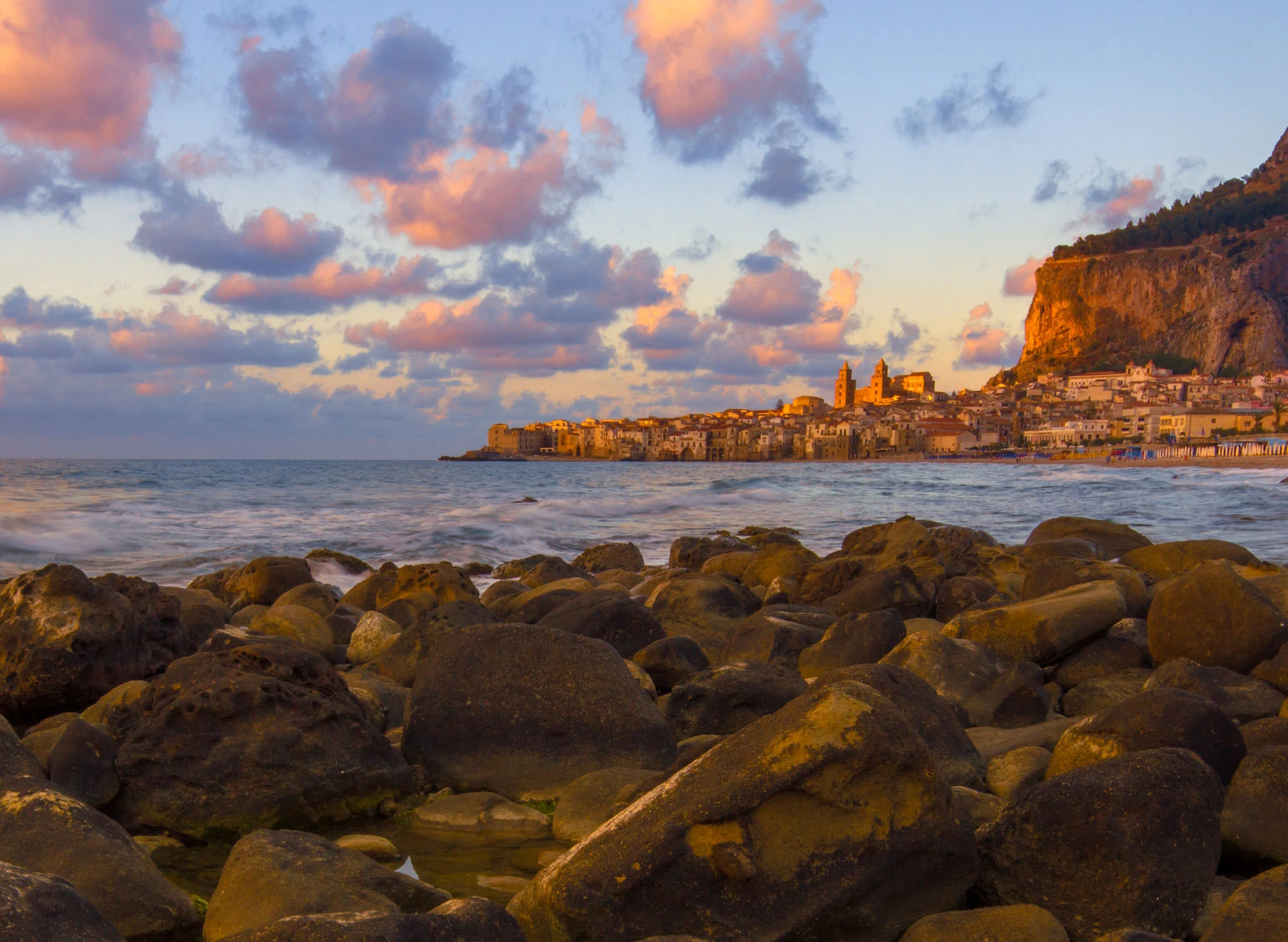
The Bright Road to
Zingaro
Exploring Sicily's Tyrhennian Sea coast on foot.
Let's say you are in a canoe, maybe it has a sail, maybe not. I'm not really sure where you're from, only that you are probably escaping from some despotic tribal government, or some drought, or some really mean people, and it's about 10,000 years ago. And ahead of you is this really large island, larger than any island you have heard of in any tale.
The island is unlike your dry, desolate climate. The cliffs are swollen with clouds of deep green trees, and there are valleys in shades of celadon, moss and apple. Whatever dreary existence you may have left behind, you see hope ahead.
Fast forward 10,000 years, and I am walking in the La Kalsa District of Palermo, capital of a very different island – Sicily, Italy.
This is the old Arab quarter of the city, built in the tenth century during an age of Muslim rule. Here the streets are very narrow, the buildings bruised by time. Bullets and shrapnel from the Second World War scar the limestone walls, but underneath that are nicks and scratches apparently dating back through most of the ages of civilization.
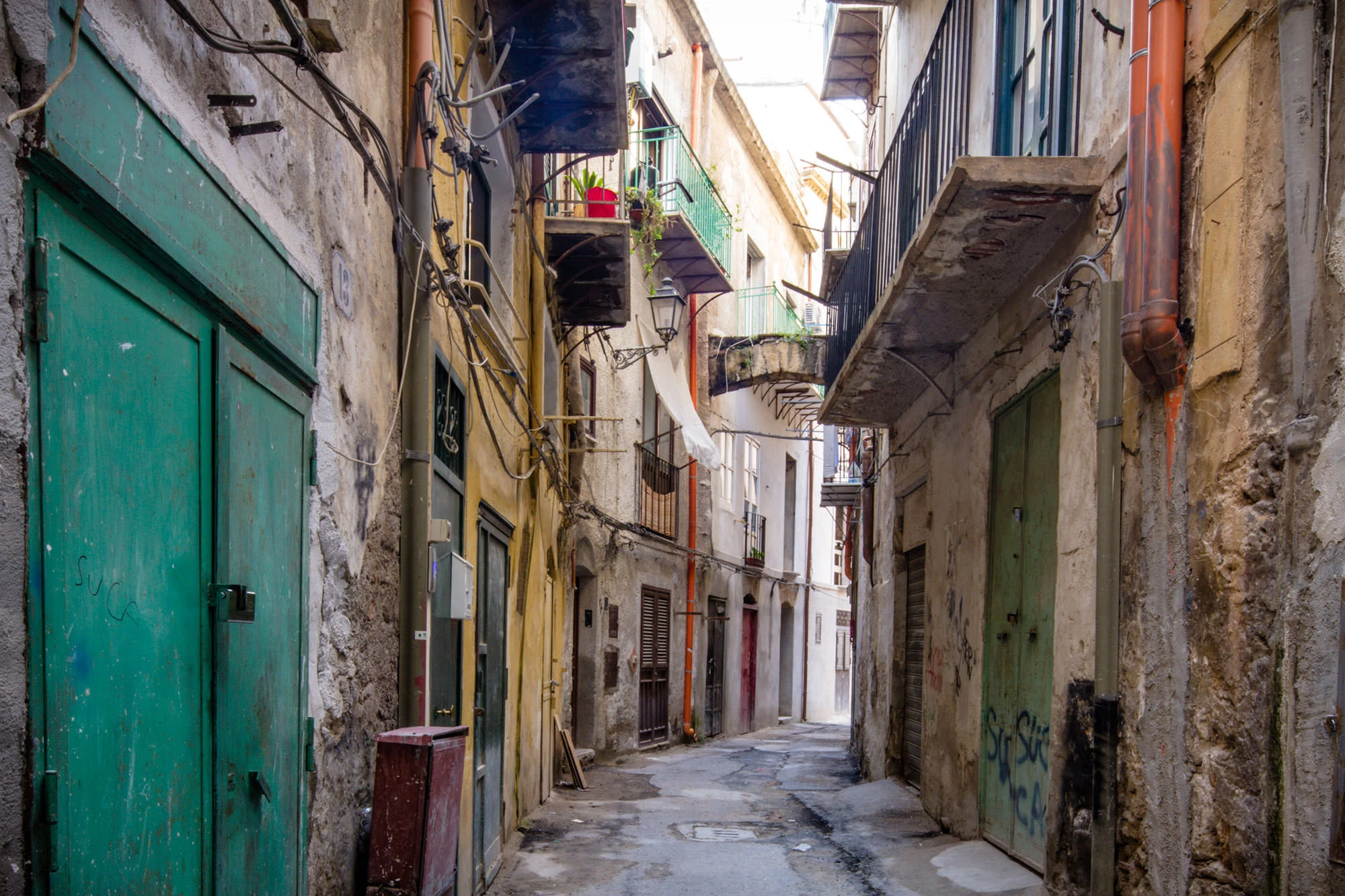
A random alley in Palermo, Sicily.
There is no continent on Earth where Sicily fails to export its archetypal imagery of a rural and rustic, sun-baked Italy at the heart of the Mediterranean. Everywhere, in the form of olive oil labels, wine bottles and faded paintings in Italian restaurants, we are showered with visions of an enduring, dry place, an emblem for all pastoral Mediterranean.
Before I left for Sicily, friends couldn't help but to ask me the same question as a dozen before them. Are you going to eat the food? Are you going to soak up all that Sicilian cuisine? The persistence of these questions reminded me that most people travel to fulfill something they believe a place satisfies for them. I don't like this idea; the idea of going to a place to see what you already know of it. Or of going somewhere simply to eat; gorging on its authenticity. I decided I needed to travel to Sicily on a blank slate; to just ignore all those things I think I know about it and the things that other people tell me are important about it.
That's how I ended up here in this tangle of walkways, too narrow for the smallest three-wheeled Italian trucks. I walk into a café for something to eat. Two men are at the counter and a third is making a coffee. Coffee is an understatement – Sicilians love to cram a thick pasty liquid caffeine into a cup fit for a squirrel. The café is lit by bare bulbs, the interior is painted gray. A wall calendar in Arabic, unopened packages lined against the wall, a single dying plant in the window. The men all turn around when I walk in.
I ask them about the story on the cover of all the Sicilian newspapers – photos of overcrowded deportation centers, rafts overloaded with dark-skinned men, women, children, angry protesters waving flags, ships spilling with humans, surrounded by military Zodiacs, and photos of dead bodies lined up on beaches.
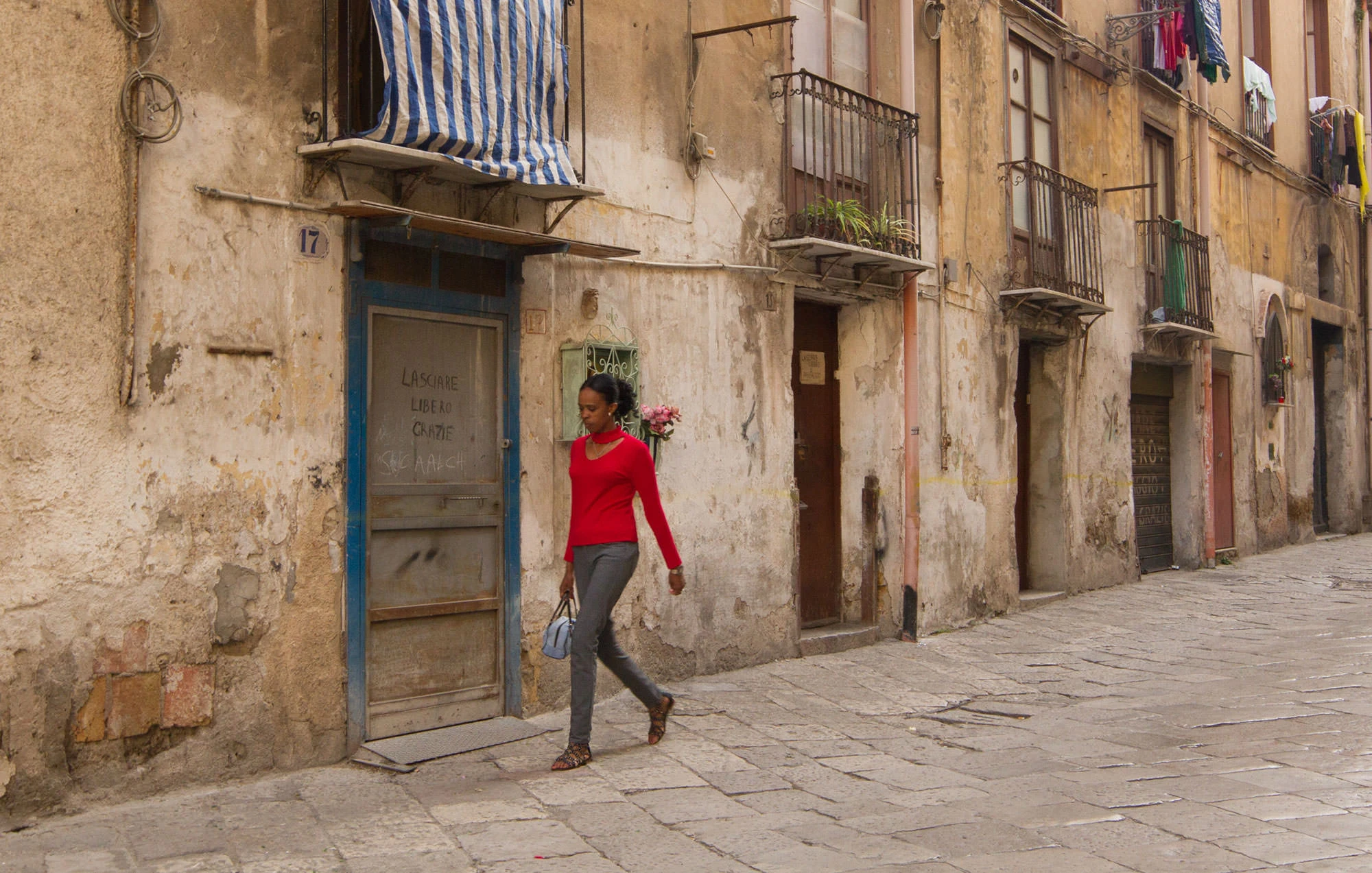
Kalsa District, Palermo, Sicily, Italy.
"They are from Eritrea, because in Eritrea today the government is forcing people to fight in the military. And they are from Syria, escaping Assad!"
"But doesn't this happen every year? It can't always be these two countries?"
"No! Every year, they are escaping somewhere different. 2012 was the worst, because the Arab Spring. They were fleeing Tunisia and Egypt. Many died. But this year is going to be the worst. It is almost already as bad as 2012 and it is only May. Many more will die, and it is no way to die at the bottom of a boat!"
The next day, I hire a driver to take me to Cefalù.
I sit in the back of his car, looking out the window, my backpack between my legs.
Needing this backpack reminds me of having spent my whole flight-time here watching this National Geographic show, Doomsday Preppers, which follows Americans who dedicate their lives to preparing for the end of days.
Usually, they believe something very specific will happen to the world – a comet, asteroids, solar flares, the Yellowstone super volcano, American debt, global financial collapse. In almost every case, the world ends for very implausible reasons; the types of reasons men of science would never worry about. In most cases, the obsession of the prepper revolves around security, because to many preppers, the ultimate threat you will face in the end days is the inevitability of others attacking you for your stores of food and water. They put up gates, they set traps, they blockade their perimeter. And most of all, they stockpile weapons.
While most preppers seem to have this weird obsession with defense, others place their priorities on what's called a 'bug-out bag.' Bug-out bag: backpack that contains everything you would need to survive a short amount of time in the event of a disaster. Many who live in earthquake, tsunami or tornado zones also quite rationally build a bug-out bag; but we're talking about bug-out bags to survive the end of the world.
Most doomsday survivalists have some sort of bug-out bag, but some place their focus more on perfecting this single item, as they predict that they'll have to go out in the world to survive it. I can relate, because for me, perfecting my daypack is directly related to my happiness on the road, and I can appreciate the preppers who obsess over the contents of their pack.
Besides driving from one city to the next, I am on foot in Sicily. It's nice traveling without a car, because it keeps me walking all day. That makes the pack more important – it's my little engine on my back; sustaining me.
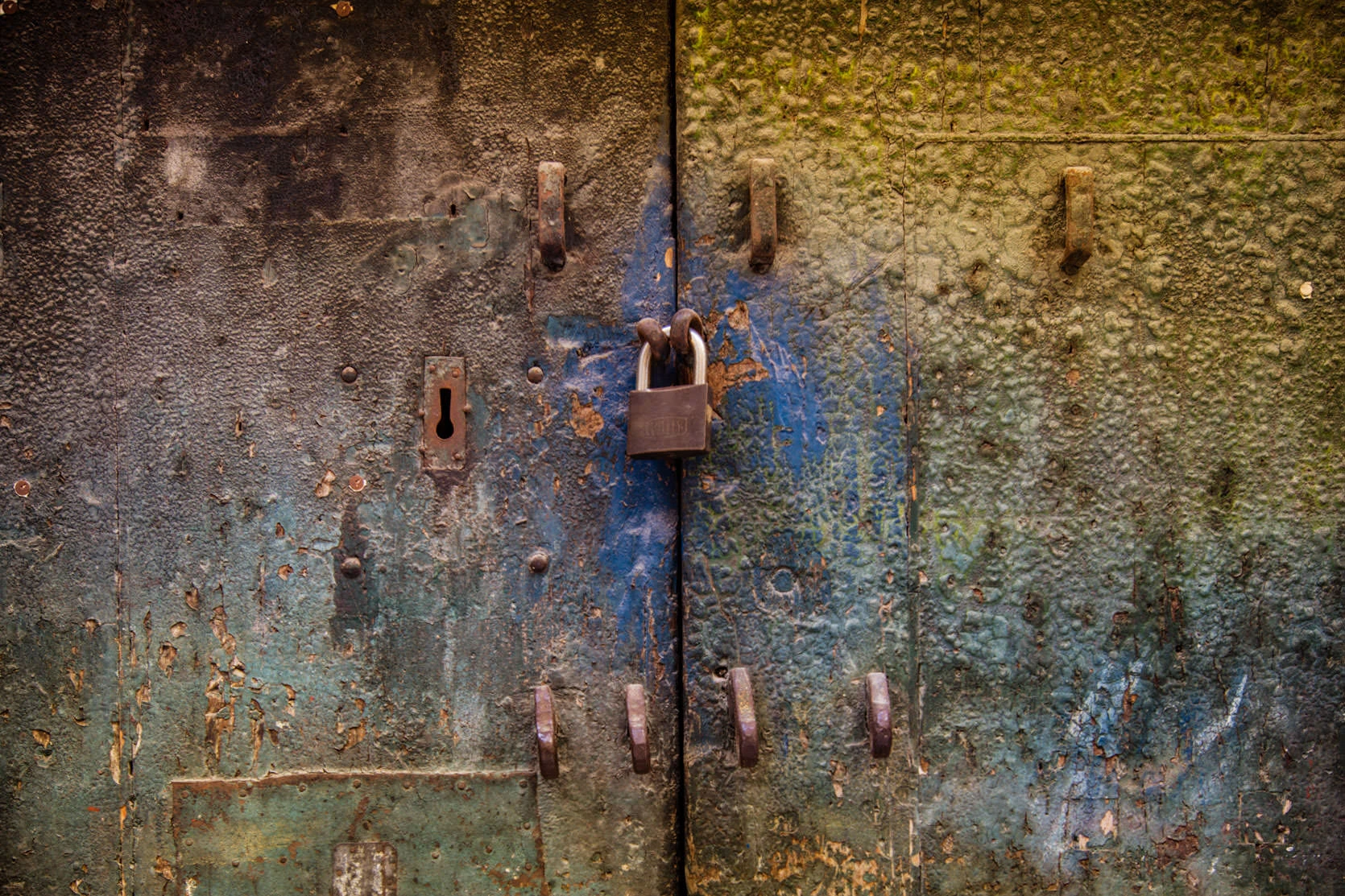
Door details from the Kalsa District, Palermo, Sicily, Italy.
On the road to Cefalù, I look down at the ocean and I imagine a dozen canoes beaching, and people in animal skins guiding their crafts to shore. And I see dwarf elephants and strange hippopotamuses tending to the estuaries near the base of the large, rivers. I am imagining your new island, rich and green.
The town of Cefalù, bordered by cactuses and arid hilltops, is one of the most beautiful in all of Europe. You can see that even from miles away, when it appears at the edge of land; a mess of Cyclopean fishing buildings and a dominating Norman church, surrounded by turquoise seas, sitting just below a huge rock.
My driver drops me off at the edge of town, and I continue by foot through the sloping city. Although Cefalù is only an hour from the capital city of Palermo, its demeanor is entirely different, and that shows up even in the color of paint on every wall. Cefalù is painted in shades of yellow, pink and sky blue; carefree colors of the coast.
Cefalù is believed to have begun its existence as a Greek fortress, chosen for its defensive geography; the mount behind it serves as an impenetrable wall. You cannot escape the theme of security in Sicily. Watchtowers line the entire northwestern coastline. If you look up at the bald mountains, you will notice, just about anywhere, the ruins of protective buildings. Most warfare in the history of the civilized world was some sort of siege warfare. It was all about the walls, and getting through them.
Nobody knows who built many of Sicily's oldest buildings. In fact, nobody knows exactly who settled the island first, or second, or third. All of Sicily's history is a spider web of all of the Mediterranean's history. Everybody came here at one point or another.
The city-state of Syracuse, on the eastern coast of the island, was obsessed with security because the inevitability of attack was imminent. The island's most famous figure, Scientist-Mathematician Archimedes, was employed by the city-state's government to fend off the Romans.
He invented delicious weapons of destruction – a claw that dropped onto attacking ships, pulling them out of the water and then letting them drop back, likely shattering them against the water. He may even have experimented with an array of mirrored shields which would act as parabolic reflectors, burning holes and setting fires on attacking ships.
Still, ultimately, Archimedes' sophisticated prep work proved no match for the Romans, who relentlessly sieged the city.
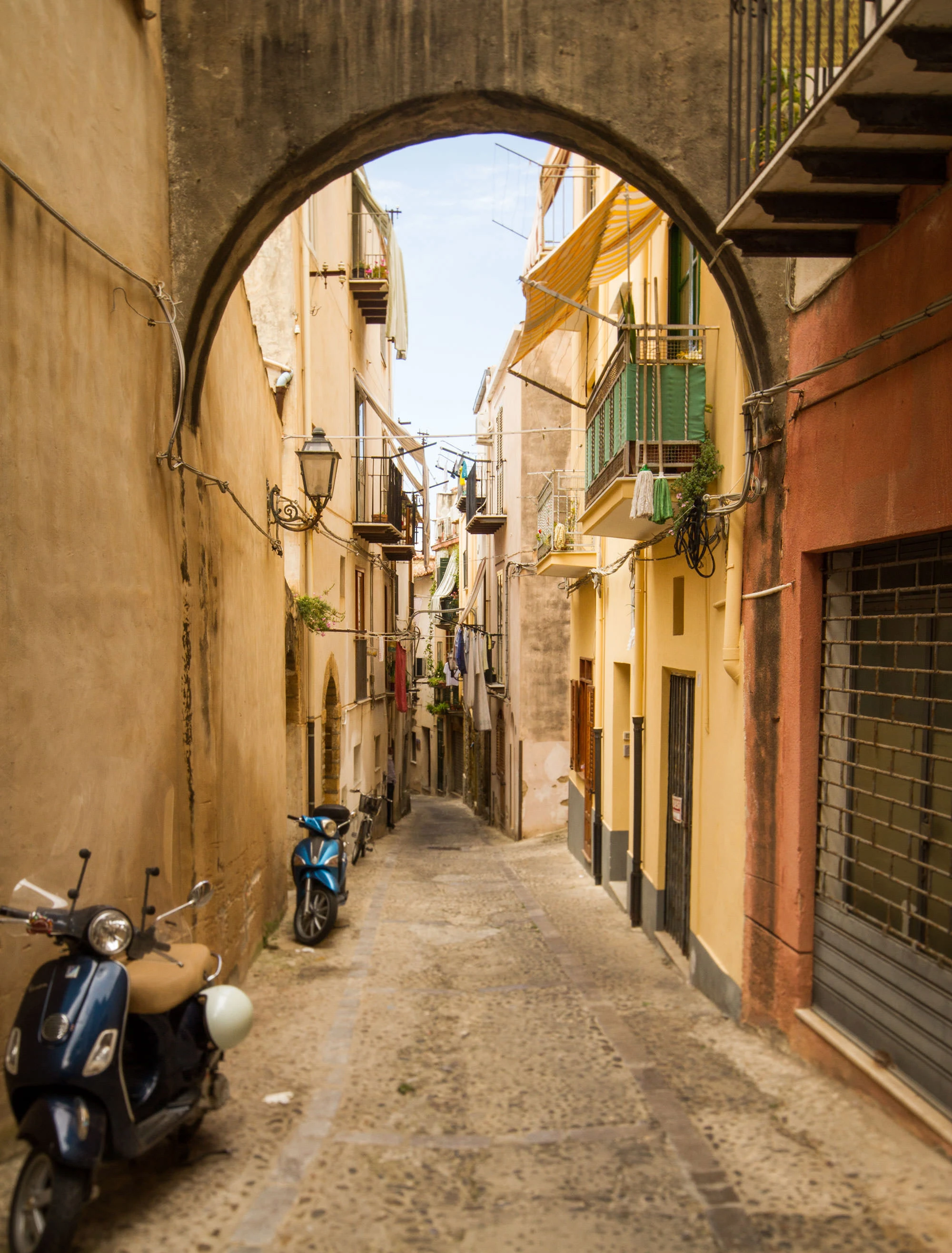
Yellows, pinks and turquoises are common in the back alleys of Cefalù, Sicily.
At one time or another, the Greeks, the Romans, the Carthaginians, the Byzantines, the Muslims, the Normans, the Germans, the Spanish, and the French, ruled the island. Italy has ruled Sicily for less than a hundred-sixty years. But Italy has lost Sicily, too. After World War II, the allies put the United States in charge of administering the island for a short time.
In all of Sicily's history, who won in the end, except for the people who moved inland, tended their farms, moved away from the action, continued on with their life? The losers in Sicily's history were the ones who erected walls and died behind them.
I climb my way to the heights of the city; literally to the point where the rock of the mount takes over from the buildings. I find a place to sit, and look out over the city. I feel like I have everything in my backpack to keep moving. This is the feeling I have always sought as a traveler.
When I am at home, I keep many things that I might need on a daily basis in my backpack – contact lens case, multi-tool, water bottle, advil, pens, watercolors. I have learned that if you rely on your backpack on an everyday basis, you make daily micro-adjustments in your relationship to those things you require when you're on the road.
When I first started traveling, I took the contents of my backpack just as seriously as I do today, but it has taken me many years to feel like my backpack is an extension of my body.
I realize that those doomsday preppers are doing what I was doing when I first started traveling. They are, by definition, preparing without experiencing. A prepper fears the future, but is afraid to experience the present. A prepper wants the independence he dreams of surviving the end-days, but is obsessed with preparation and security. He is willing to forego experience today for a slim possibility in the future.
Stop preparing! Stop trying to imagine the perfect backpack! It's impossible to do from home in isolation from experience. Forget the apocalypse, because the real reason you are a prepper is that you want that backpack on your back; you want to be out there under the sun. What I want to say to the prepper is: Leave at home your emergency rations, your Potassium Iodide capsules, your handgun, your charcoal tablets, and your bolt cutters. Shave that room in your bug-out bag and surprise yourself with the room for a ukulele, an extra pair of flip-flops and a fifth of rum.
I hire a driver to take me to the Trapani municipality, a three hour drive along the Tyrrhenian Sea and through the interior of the northwest of the island. I look out the window at the beef cattle, fields of melons, the groves of olive and citrus trees. I see the toppled rocks of an old estate. A modern almond processing facility along the road. An arch bridge.
I can't help but imagine you on your island, 10,000 years ago. I don't know exactly where you come from, only that you had little relationship to the sea, because you came from inland, and your ancestors were herders and game-meat eaters. You don't eat seafood, and so you move inland to settle the green river valleys. You eat the meat of the dwarf elephants, easy prey. Their population dwindles in your lifetime, and so you move on to the hippos.
It's only a matter of a single generation before you kill off all the big animals of the island. As game meat dwindles, your descendants take the exact course of your ancestors. They plow the fields, and begin to grow the staple crops of the Mediterranean.
Your descendants will cut down the forests and plow fields. Their children's children will see new canoes on the horizon. They too will take to the plow.
In perhaps a few generations more, men and women in animal hides will begin the transformation of a green, lush climate. As the trees go, so does the rain. And so, throughout its history, this island, which is actually the same island I am driving across today, loses its megafauna, its climate and its forests, and it transforms into a very different place – into that timeless rocky, dry place we know as Sicily.
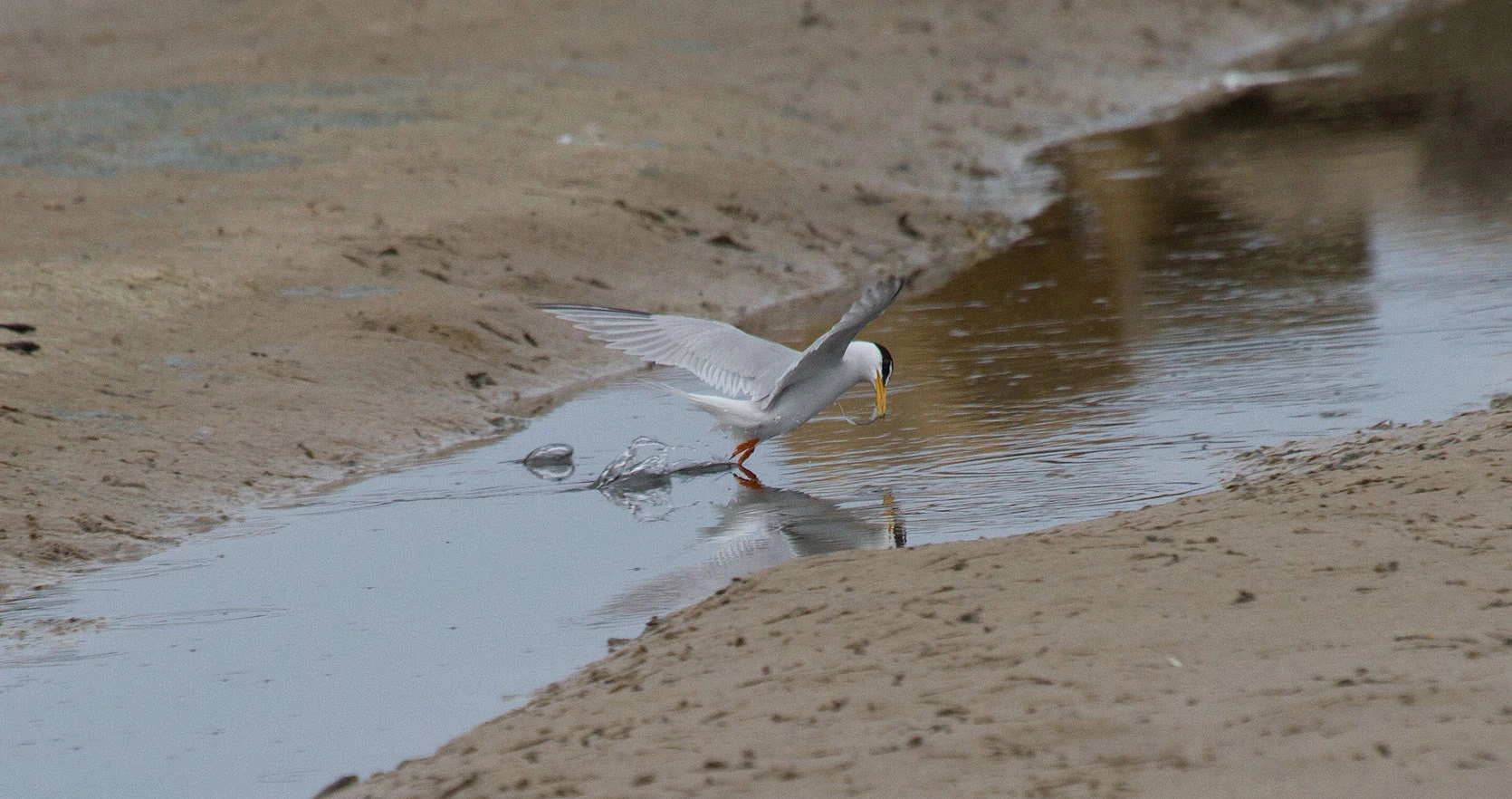
A Little Tern pulls a sardine from the salt flats near Trapani.
My driver drops me off just south of Trapani, in the city of Xitti, which is adjacent to a series of salt marshes.
It's hot out, and there will be no trees on the extensive salt flats where I'm heading. I decide to walk very slowly, and to use a tiny orange umbrella I packed to shield myself from the sun.
I walk on a road across a wide meadow of barley-grasses and red poppies. I pass by a handful of farm-houses.
The farm-houses are fortified with heavy gates. Glass is broken and pasted at the tops of concrete walls. Dogs snarl at me from under the gates, showing their fangs. One thing is for certain on lonely country roads in Sicily, dogs will bark at you and snarl at you from behind fences and gates. The noise can be deafening.
I am no fan of dog owners who let their dogs bark at passersby. For whatever faint sense of security it may offer them, it comes at a daily cost everywhere around the world; a subtle threat and an acute annoyance to the traveler. But how can these neighbors live with each other, with their dogs barking like this? It's that siege mentality in people; turning their homes into miserable little fortresses. I am certain none of these houses needs a gate or a fence or a single barking dog.
I continue on down the road, past a small citrus grove. I hear a song in the distance. What is that song? It's YMCA by the Village People, but in Italian! I hear the sound getting louder, and louder. It's a vegetable seller in a tiny Italian truck, advertising his presence to the farmers and salt workers.
The sound is loud and tinny, as the truck approaches, and when I am only a few feet away, he stops the truck and stands in front of it, as if waiting for customers. But nobody is out here except for the two of us. I say hello and keep walking, and then realize that perhaps that truck is the only food I will find today.
I turn around to buy some carrots and apples. The jovial fruit-seller, who looks to be in his fifties and wears a good-sized paunch, is clearly really happy that YMCA is playing. If a balding man in his fifties listening to YMCA at noon in the salt marshes of Trapani is representative of the spirit of the Sicilian man, what does that say about the Sicilian man? I couldn't place my finger on it.
I continue to walk out across the salt marshes until I find barb-wires and a metal fence blocking my way. Beyond the fence is a narrow 18-inch walkway across some salt estuary. It would be good to go there, I think, and I trudge through the thick, dry grass along the fence's edge for a few feet, and then…a hole in the fence, clearly cut by a wire cutter. Good man, whoever that was.
I crawl through the hole in the fence, and across the walkway. These are the walkways that separate the salt pans; allowing salt workers the ability to section off and dry the salt as each pan evaporates slowly during the long summer. I cross the pond, and find, to my disbelief, a small group of Little Terns, fishing at the edge of the drying pans.
I have never seen Little Terns before, although I know them to be Little Terns because they are, well, very little. I decide to sit at the water's edge, eat my apples and carrots, and hide beneath my umbrella, for an hour, watching the terns.
All terns are spectacular flyers and fishers; their movements are completely unlike any other bird. I watch a tern repeatedly drop from fifty feet in the air to just a few inches above the water, and precisely drop his lower jaw along the edge of the water, pulling up a tiny sardine each time.
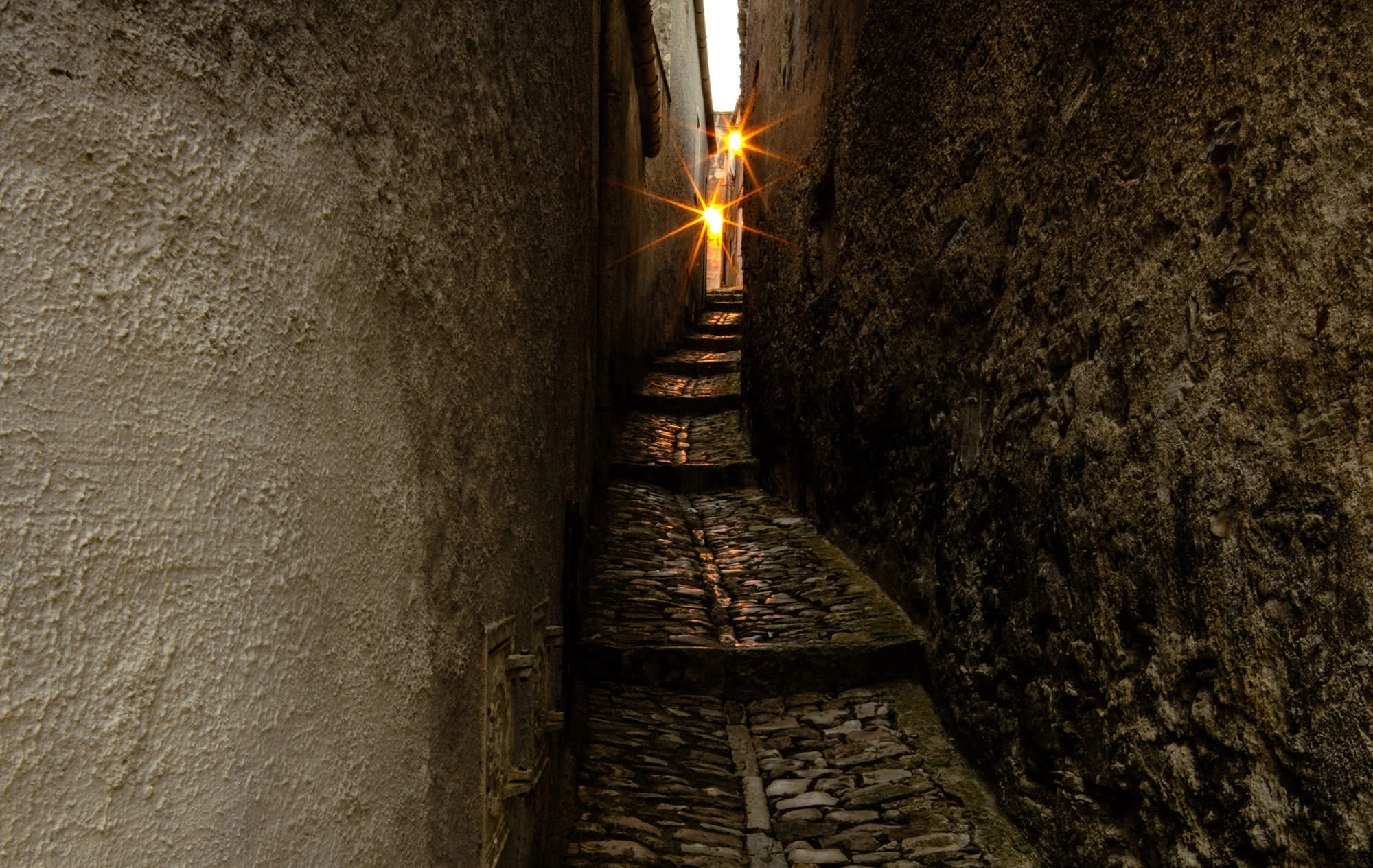
A narrow alley in Erice, Sicily.
A small tern flies completely differently than a large tern; more maneuverable, like a dragonfly or a hummingbird. They are faster, sleeker, and almost bullet-like.
Did you know that the Little Tern migrates from Sicily to Australia? How far for such a little bird. Does a little bird who crosses half the world comprehend something of the world that a termite doesn't?
But Little Tern populations have dropped precipitously in the last 120 years. As riverside developments have encroached across Europe, the Little Terns have disappeared. They are not yet threatened globally, but their habitats throughout Europe have simply disappeared.
A group of five salt workers, who had been eating their lunch on a nearby salt island, cross a bridge and approach me. The first thing they do is to suggest that I go elsewhere. I could have taken this to mean they didn't want me on their salt flats. But I understood this word they said - fenicottero. The flamingos should be over there, they were saying.
No, I try to explain, I am in fact looking at the Little Terns, which are right here in front of me. At first, the men don't understand what I am looking at, or perhaps even that there is something other than everyday barn swallows in their salt flats.
But one, who accepts my invitation to borrow my binoculars, begins to follow a tern. The animal conducts a series of advanced acrobatics as if on cue, and drops into the water in an amazing aerial display. The other men begin to ask for the binoculars. I try to tell them that this is a really special little animal, that it travels halfway around the world. All but gone from Europe, and that they still thrive here because of the salt flats that also employ them. They may not understand me, but when I say goodbye, I imagine that they'll always watch the terns at lunchtime.
I walk to the salt flats museum, which is nearer the Mediterranean Sea, and I call for a taxi to Erice, which sits at the top of a 2,400 foot mount overlooking the Aegadian Islands.
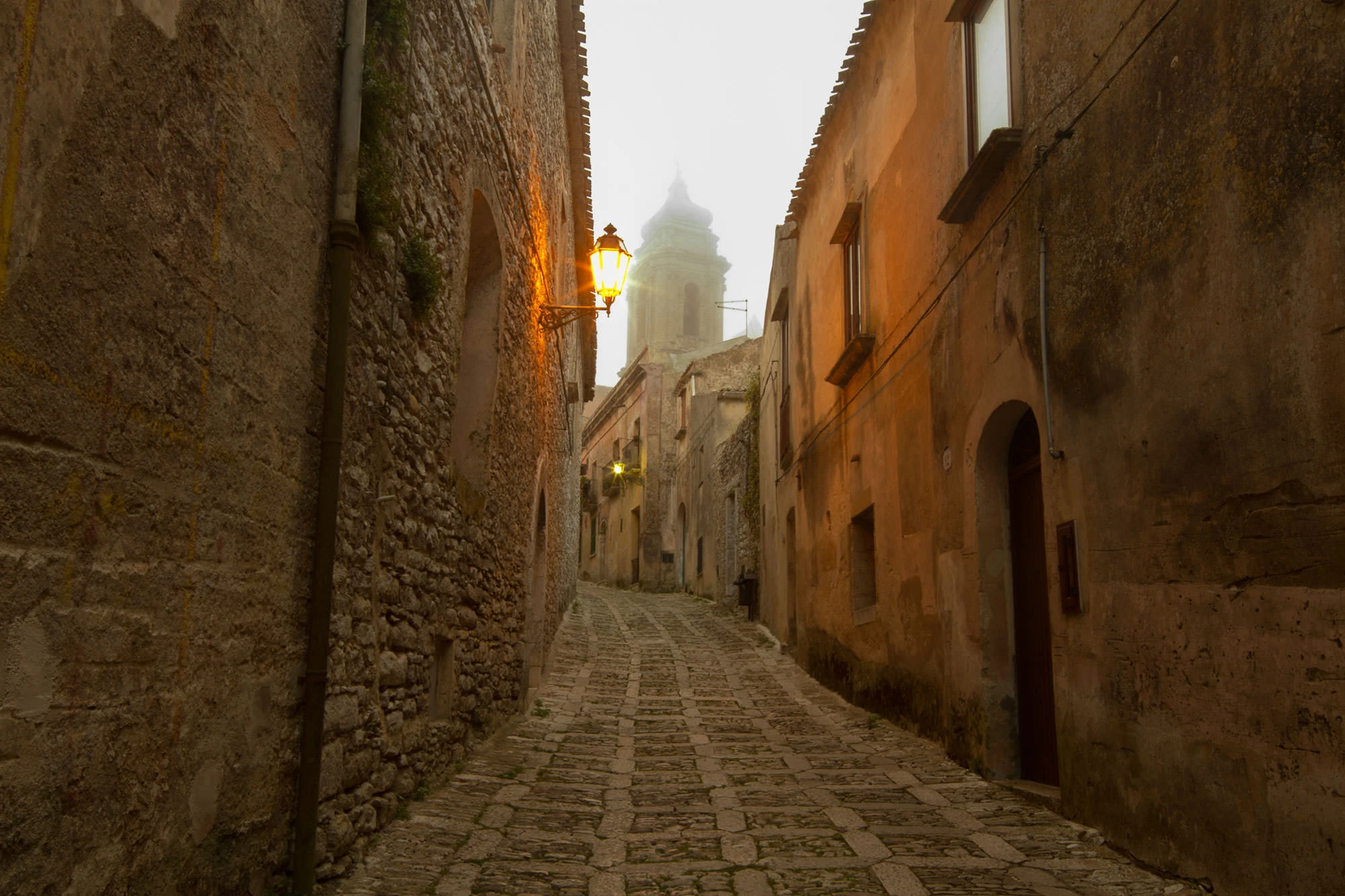
Chiesa di San Giuliano in Erice, Sicily, Italy.
Erice's city-center, at the pinnacle of Mount Erice and made of stone, is tiny with fewer than 800 residents. I sit down at an outdoor café, and, exhausted from the heat of the salt flats, order a local charcuterie - Salame Sant'Angelo, with bread, olives and a Canestrato cheese. The meal, entirely Sicilian, is simple, but beautiful.
I cannot help but think about how the stories of these simple foods actually intertwines with Sicily's own story. It's true that the history of cheese and cured meats production was perfected and distributed by the Romans, and that Sicily's cheeses and cured meats are largely a product of this era. But if you go back about 8,500 years, long before the Roman Empire, to the region of Anatolia at the far eastern edge of the Mediterranean, you'll note the huge tax that increasing human populations are having on the environment. Mankind's successful populating of the levant was bringing on erosion, deforestation and degradation of the soil.
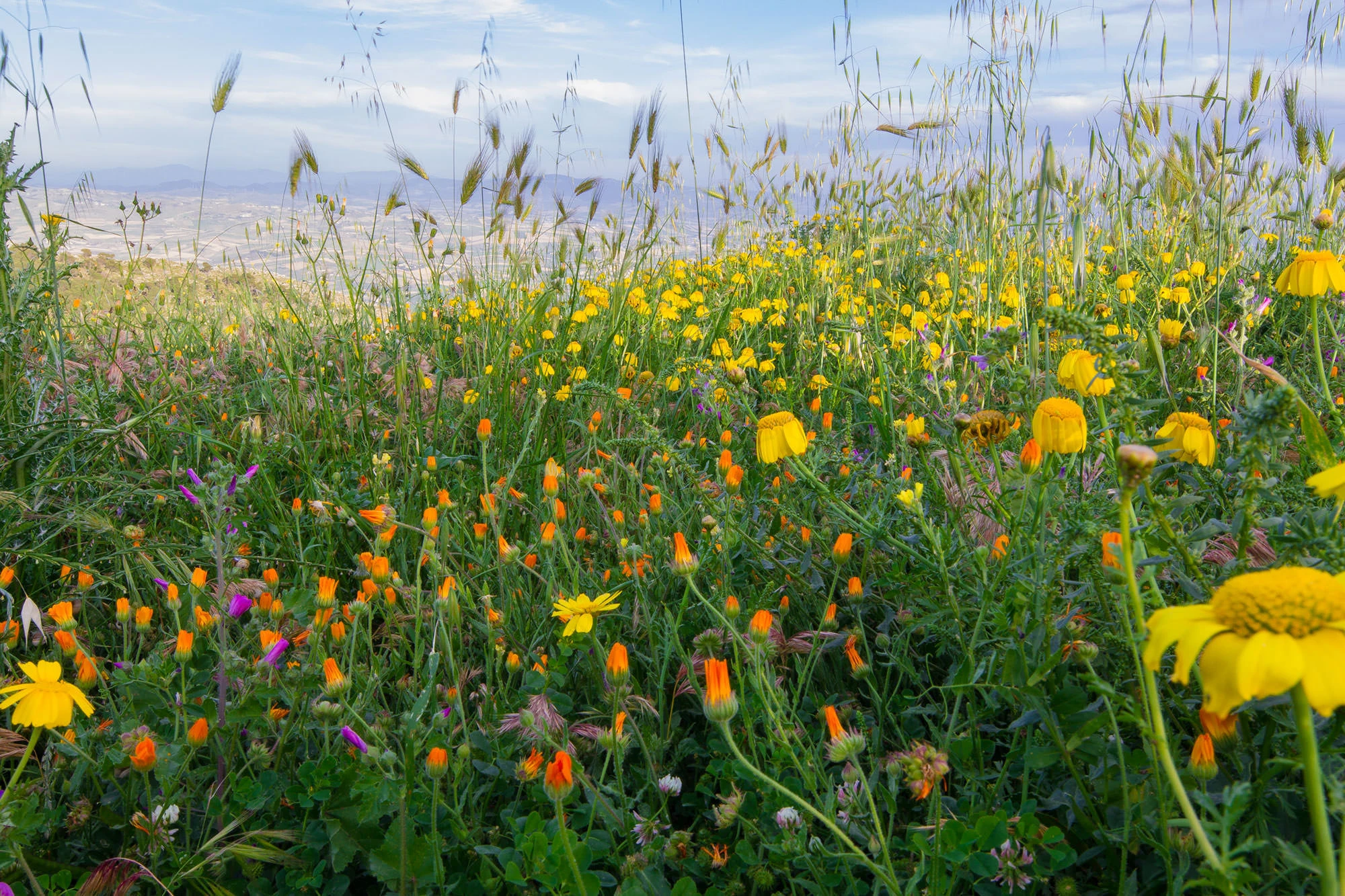
Flowers in bloom on the slopes of Mount Erice in Sicily.
The changes that man exacted on this part of the world were so severe that it would impact Sicily's future in two very important ways.
Bones of animals in the levant reveal that around this time, men began to use their animals as grazing animals, rather than for meat. As the Anatolian environment dissipated, a farming-based society was forced to turn into a herding society; relying more on animals for milk than for meat. This was the region where milk developed into a staple of civilization; where curds were invented; where cheese began.
So, Sicily, then, whose salami's and other cured meats are typically and historically by-products of farms that produce cheese, benefitted culturally from the desertification of the arid lands to the far east of the Mediterranean. But more importantly, the same desertification ultimately pushed people out of the Levant, in desperate migrations to other parts of the Mediterranean and Europe. The desertification of the Levant loaded Sicily with new ethnicities.
The next day, I walk down a path, into the woods, across the road and out onto a field of brilliant wildflowers. From here, I can see for miles across the province of Trapani - hundreds of farms – olive trees, wine grapes, melons. It is a stunning view; that view we all dream of when we think of Sicily. When you look at these agricultural lands not as something that has been there forever, but something that replaced and transformed a once green-island, you appreciate it differently. The Italian government is growing more and more concerned that Sicily, along with the other over-cultivated, deforested southern provinces, are quickly moving towards the same desertification that defines coastal North Africa.
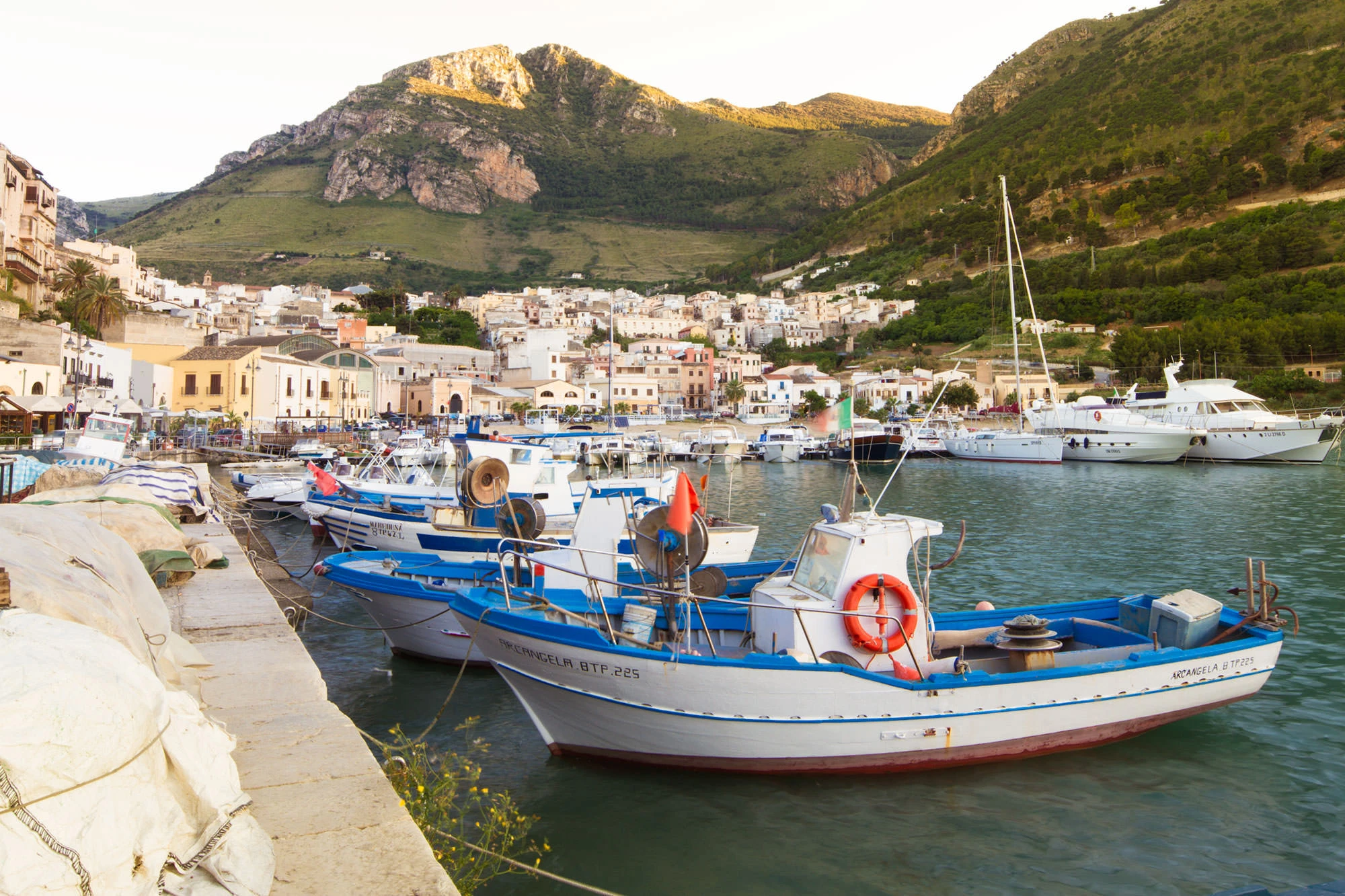
Fishing boats in the marina at Castellammare del Golfo.
Sicily once was home to huge rivers throughout the island; these rivers were navigable by large ships. Today, the rivers are more just seasonal washes. I cannot even see a single river from here. In the distance is an artificial lake: preparation for a drought siege.
Italy has declared a state of emergency over the threat of desertification, but now, climate change is accelerating a process that began 10,000 years ago.
Nobody knows exactly what happens next, but because Sicily is an island, it makes a nice laboratory for a process that everybody knows is now inevitable.
The next day, I hire a driver to take me to Castellammare del Golfo, on the northwestern tip of the island. This ancient sea fortress interests me because, along with Erice, was part of the bronze-age Empire of the Elymians, who are believed to have originated in Anatolia, and who almost certainly were escaping the diminishing climate of their land.
In the evening, I ask my driver if we can stop at a convenience store or a grocery store, because I will need food for the next few days. "We aren't 24-7 in Sicily like in the United States," he says. Why do they always say that? "The grocery store just closed."
My driver pulls up to the grocery store anyway, and knocks on the door. I know you're closed, he says to the workers' inside, but is there any way you can let my client get some groceries?
And they let me in. As I rush through the grocery, picking up crusty bread, a bottle of Sicilian white wine, liters of water, dried fruits and a summer salami, I see another newspaper headline. The photo is of more bodies on the beach. An inset shows the source of undocumented immigration trends to Sicily. And then I realize something.
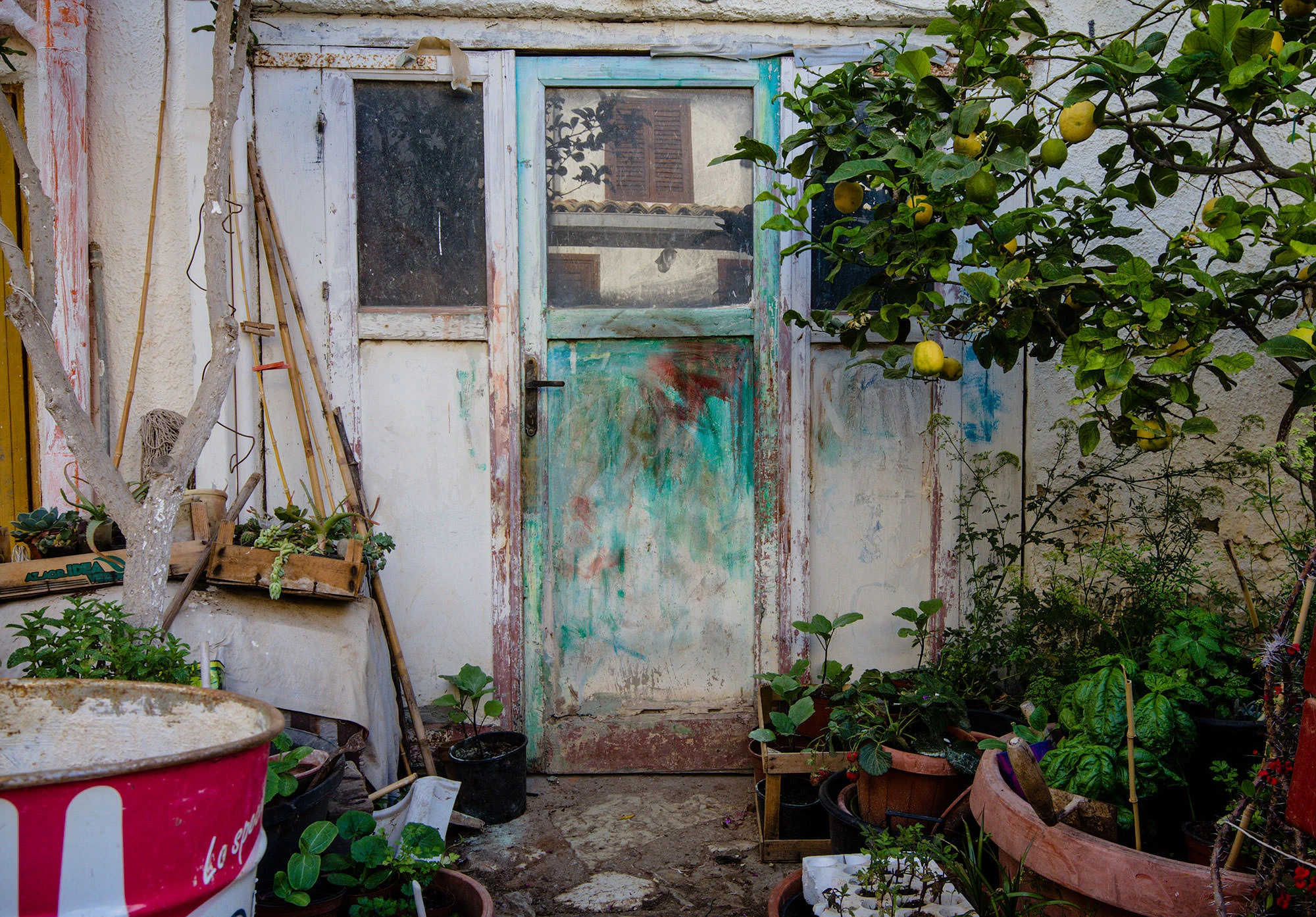
Lemon tree at the door of a gardener's shed in Scopello, Sicily, Italy.
The next day, I am in an isolated beach community just north of Scopello, looking out over the Tyrrhenian Sea. I've rented a flat on the beach.
I decide to walk down to the ocean, where I find a small beach shack. The beach shack owner speaks some English, having spent some years in New York, and so I bring up the YMCA song from the salt flats. "Things that matter elsewhere, don't matter here. At their heart, Sicilian men just love life. We can dance to a cheesy song in the sun."
From the beach, I walk to Scopello to see if I can find some more food for the day.
Somehow, I take the wrong road, which turns into a stone path, and then no path at all, and then I am in bamboo and thick brambles, and then, I realize I am on private property, well protected with high fences. Fences! And then, as if on cue, a big black snake surprises me. Didn't I read that no snakes in Sicily are venomous? I can't remember, but the fright sends me further into the private property, and the bamboo.
Finally, I emerge on the road to the park. The steep and rugged hill to the main road was brutal, and I'm panting in the hot sun. But I have my backpack, and my backpack has everything I need to stay on the road all day.
I first walk to Scopello, where I buy a large pistachio gelato. Actually, I have been doing this for my entire stay in Sicily. It's too hot to eat anything else, and it's completely normal to have gelato for breakfast in Sicily. I buy almonds and pistachios from a farmer, and two more liters of water. I plan to spend the day in the hot sun.
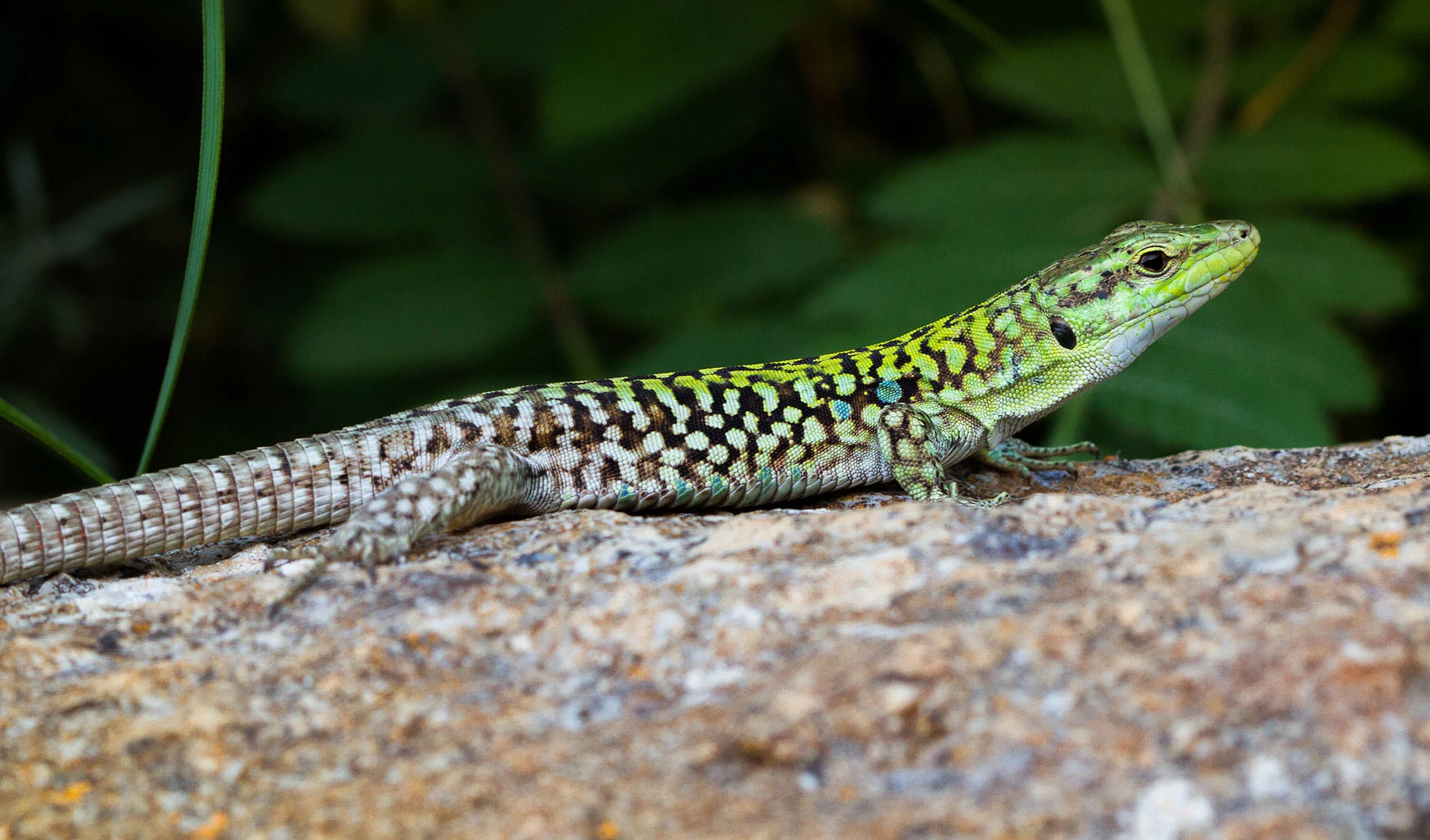
A Sicilian Wall Lizard (Podarcis waglerianus) in the Zingaro National Park in Northwest Sicily.
I leave Scopello, walking toward the Riserva naturale dello Zingaro, a seven kilometer mountain and coast park, protecting one of Sicily's last remaining natural habitats.
I am in a great mood, perhaps because my entire day ahead of me is a blank slate. I decide to take my time heading for Zingaro, looking at birds, lizards and orchids along the way. I'll stop to talk with anyone who cares to talk with me.
Bougainvillea drapes the roadside edges, and along the entire route I have wonderful views of the Tyrrhenian Sea. I see a Blue Rock Thrush jetting between cactuses, Sardinian Warblers in the scrub, and a European Stonechat sitting on an electrical wire.
Many Sicilian birds, especially this time of year, are just passing through. Anything that summers in Europe may turn up in spring on Sicily. The island is like a lone motel on a desert road; it's a necessary rest-stop.
It reminds me of that newspaper map I saw in Castellammare del Golfo. Few undocumented immigrants actually stay in Sicily. Sicily is just a necessary stop on a desert road to greener pastures. It's an established roadstop for human transport syndicates that operate throughout the Southern and Eastern Mediterranean.
Migratory birds leave North Africa and the Near East each year when the seed and fruit bounty of those regions dissipates. But isn't it curious that human immigration through Sicily is almost exclusively from similar regions – Tunisia, Eritrea, Libya, Syria – and that they are from the very regions that have undergone or are undergoing extreme desertification?
I'll leave the politics of European immigration to the Europeans, but I can't help to notice that the pattern of undocumented immigration into Europe reveals a story that is not new at all, but 10,000 years old. It's an eternal human story; the act of being forced out of marginalized land.
Sometimes, my fellow travel bloggers ask why I might bring up the role of land degradation and climate in a travelogue. But actually, in the actual world we live in, climate is central to the human story right now, as well as to our history. It plays a role in economies, in immigrations patterns, in declining bird populations. Climate change is also colorful, alive, and central to the creation of our most coveted historical places. Sometimes, we pretend that places are just old and unchanging. It makes a nice travel story, but it's not the whole story.
Have you ever heard a climate denialist say this: man has no real impact on the planet. This new science of climate is a fraud because nature is too powerful for man to influence it.
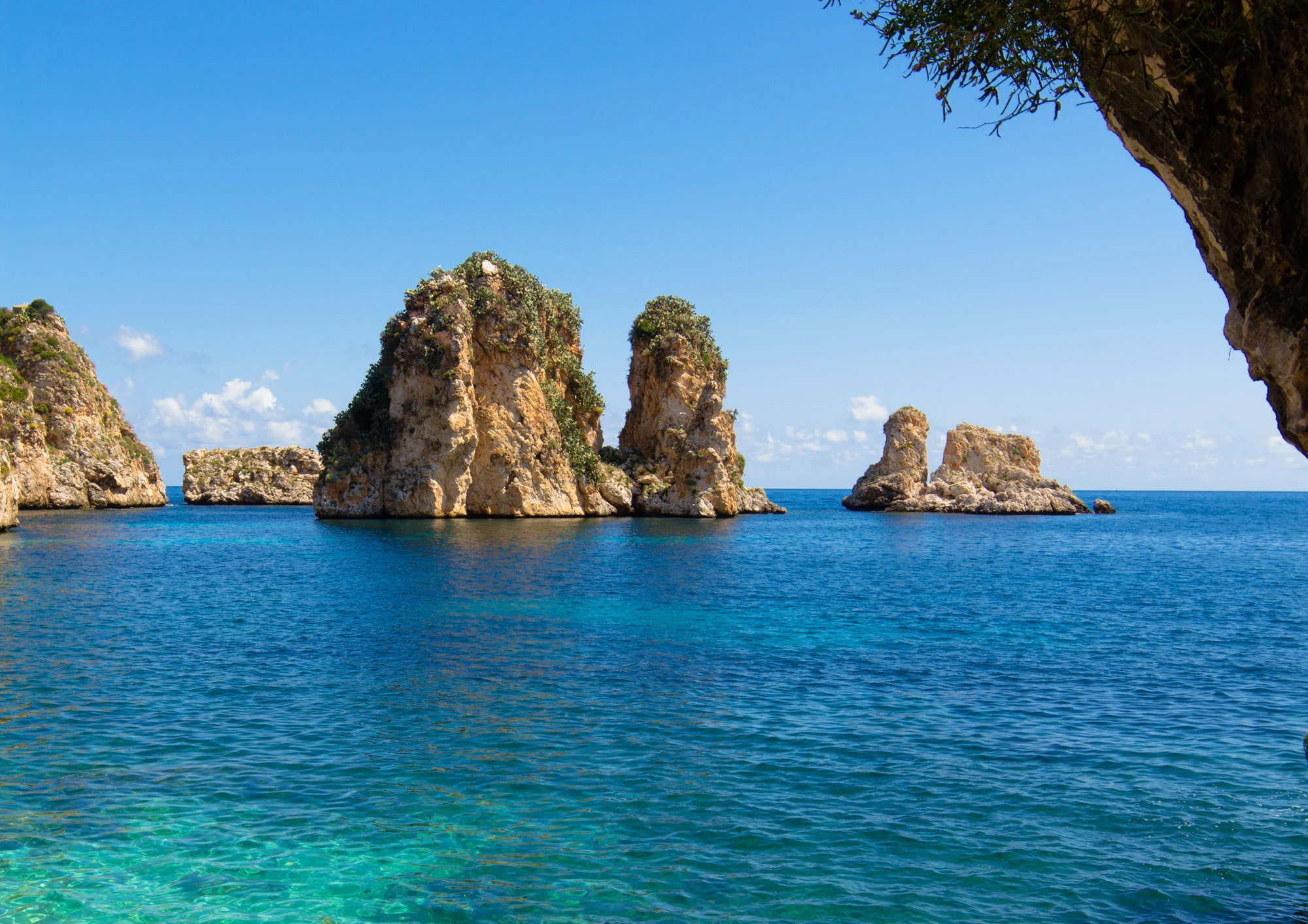
The Tonnara di Scopello, near the town of Scopello in Sicily.
But the climate denialist should stop sitting in his darkened living room, peering out at the world with his eyes and making assumptions about it, because Sicily's history, a central figure in many ways to the history of civilization, is not just a political history of sieges and sea battles. This most central human story is also a story of changing climate, and that story reveals itself in everything that is happening in the Mediterranean today.
Greece and Rome both conquered Sicily. Both lost it as their empires crumbled. Today, historians are learning that part of the multifaceted downfall of these kingdoms was on the heels of the environmental degradation of their empires.
I know now why I dislike those doomsday preppers who lock themselves behind gates and fences. They are in it for themselves, locking doors and setting up perimeters. There are many similarities between today's climate deniers and today's doomsday preppers. They both appear more obsessed with their own survival than with the viability of humanity itself. They are suspicious of science. They see much bad in people, but rarely talk about what might make the world a better place two or three generations from now. When they look at the future, they see themselves with a gun against the world. It's the siege mentality for the twenty-first century.
I can never be like that. I can never lock my doors on the world, erecting fences and peering out my darkened windows. I want to be out in it. To be a part of it. To accept it for what it is. To engage in its future, and face those grim possibilities in the atmosphere and the soil, and to try to do something about it. To be out there, walking free on a bright road to Zingaro.
